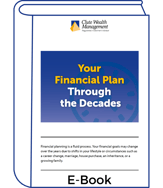2 min read
Discover Your Perfect Practical Financial Plan at Any Age
Heidi Clute : February 11, 2021

Having a solid handle on your financial well-being makes for one less stressor – and better sleep at night. But then you probably know that. Let’s explore some of the stereotypes and misperceptions that can get in the way of building your financial confidence and reducing stress through planning — and practical ways to get started or move ahead with your plan.
Financial Planning Stereotypes and Myths
Many things can come between knowing what you should do and actually doing it —the fact that fewer than 1 in 4 Americans get the recommended amount of daily exercise is a well-known example. Here are the barriers to financial planning I hear most often:
- Financial planning is only for lottery winners or those with grey hair
- Do it once and you’re done
- You’ll be locked into a plan you cannot change
- Financial planning can wait until tomorrow
We’ve written about the stereotypes and how your financial planning needs change over the decades, but it’s that last myth, it can wait until tomorrow, that the COVID-19 pandemic brought into sharp focus. During the pandemic, financial wildcards hit people in many ways:
- Job loss or business decline for solopreneurs
- Adult children bouncing back home with aging parents
- Death of a spouse
- Severe illness requiring long-term care
Because people with a financial plan are more likely to have considered what-if life scenarios, it can be easier financially and emotionally to respond to a sudden change. A thoughtful plan should include consideration of necessary insurances; your advisor will help you determine needs for life insurance, long-term care insurance, and other types, depending on your situation. Insurance can provide protection for loss of income, benefits for surviving spouses, or benefits to help supplement the cost of nursing home care.
Your financial plan should also include saving strategies for your different “buckets”. Building a short-term savings or emergency fund is a crucial step for creating a strong foundation for your finances; this can help relieve stress when you have a loss of income or unexpected expense. A mid-term bucket is a savings or investment account to save for longer-term goals and large purchases (ie. housing, cars, after-tax retirement income). A long-term bucket is usually a retirement plan or IRA for most people; this bucket is intended to be used later in life and savings contributed to these accounts should be left alone until retirement. For those who are retired, this is a major source to pay for living expenses if you don’t have another retirement income source.
Getting Started
Assessing your current financial health and fitness is the first place to start. I recommend any one of three short sets of questions to ask yourself. Two self-assessments will even give you a quick score of how you’re doing based on your age. Knowing where you stand can be motivating because there are simple steps you can take to improve your score – as well as your sense of financial health.
Three resources to assess your financial health and stability, whatever your age:
- Find out your financial well-being, Consumer Financial Protection Bureau (online, self-scoring)
- Financial Fitness Quiz, Rutgers University Extension Service (PDF) (offline, self-scoring)
- Your Financial Health Checkup, Clute Wealth Management (no scoring)
You’ve Got This!
I am known for saying: “None of us are guaranteed a tomorrow.” Whatever your age or situation, you can begin to build your financial confidence and well-being by controlling how prepared you are for life’s wildcards. Go for it — start today!
Your Financial Plan Through the Decades E-Book
-------------
Heidi Clute, CFP® of Clute Wealth Management in South Burlington, VT and Plattsburgh, NY, an independent firm that provides strategic financial and investment planning for individuals and small businesses in the Champlain Valley region of New York and Vermont. Heidi is a member of the inaugural group to successfully complete the American Heart Association and Financial Planning Association® certificate program, Philanthropic Solutions in Financial Planning. Content in this material is for general information only and not intended to provide specific advice or recommendations for any individual.




